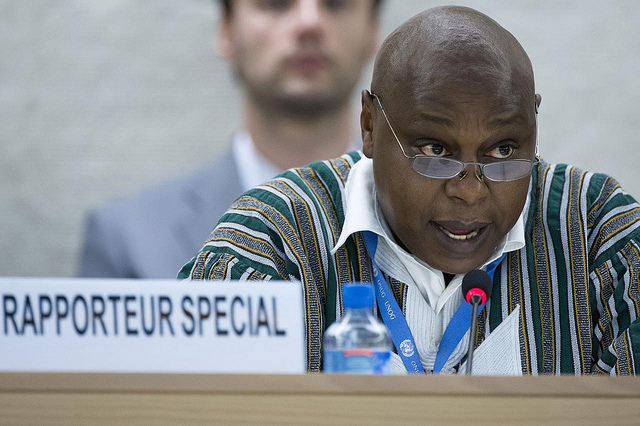
On February 19, 2015, the special procedures of the United Nations Human Rights Council submitted to the Human Rights Council a joint report summarizing all communications concerning alleged human rights abuses that the special procedures sent to States between June and November 2014, as well as State replies to these communications received from August 2014 through January 2015. See Human Rights Council, Communications Report of Special Procedures, UN Doc. A/HRC/28/85, 19 February 2015. The report provides summaries of each communication and hyperlinks to the special procedures’ letters and appeals, as well as to State responses, when available.
The special procedures are independent experts appointed to monitor human rights related to specific themes or particular countries. They submit a joint report to the Human Rights Council on an annual basis that summarizes their communications with States and third parties regarding alleged human rights violations. The 48 special procedures that participated in this report submitted 905 communications from June through the end of November 2014, and received 443 replies by the end of January 2015. However, the total number of communications and replies is lower because these statistics do not take into account letters that are jointly submitted by multiple special procedures. See id. at 7–8.
UN Special Procedures: Communication Mechanism
While the scope of special procedures’ communication mechanisms depends on their specific mandate, special procedures are generally authorized to communicate with States when they receive credible information asserting that a human rights violation has occurred, is occurring, or is likely to occur. In cases where the human rights violation has already occurred, special procedures may send a letter of allegation to the State. This letter, which describes the alleged violation, outlines the State’s human rights obligations, identifies questions regarding the alleged violation, and requests the State to follow-up. If the alleged violation is time-sensitive, for example, involving a potential loss of life, the special procedure may issue an urgent appeal, where it notifies the State of the alleged violation as soon as possible so that the State can act quickly to address it.
Communications Submitted by Special Procedures
Between June and November 2014, the special procedures that submitted the most communications were: the Special Rapporteur on human rights defenders, who sent 112 communications with a 58% State response rate; the Special Rapporteur on the freedom of expression, who sent 99 communications with a 52% response rate; and the Special Rapporteur on torture, who sent 95 communications with a 51% response rate. As stated above, these communications include those that were jointly submitted with other special procedures. See id.
Other special procedures who submitted a large proportion of the communications include the Special Rapporteur on the freedom of peaceful assembly and of association (87 communications with a 54% response rate), the Working Group on arbitrary detention (73 communications with a 51% response rate), the Special Rapporteur on summary executions (62 communications with a 42% response rate), the Special Rapporteur on the independence of judges and lawyers (57 communications with a 54% response rate), and the Working Group on discrimination against women in law and in practice (50 communications with a 34% response rate). See id.
The country-specific special procedures generally each submitted between zero and four communications to the respective State. One exception is Iran, which received 18 communications from its Special Rapporteur; as of January 2015, Iran had responded to four of these communications. See id. at 8. Regarding the subject matter of these communications, on July 15, 2014, for example, the Special Rapporteur on the situation of human rights in the Islamic Republic of Iran submitted a joint urgent appeal with six other special procedures addressing the alleged arbitrary detention, denial of medical care, judicial harassment, and ill-treatment of individuals involved in human rights activities. See id. at 35.
In the appeal, the special procedures requested information regarding the legal grounds for the arrest, detention, and restriction on freedom of expression; measures taken to ensure that the detainees have access to health care and that human rights defenders can carry out their work in Iran; and details of any investigations carried out regarding the detainees. The State responded on January 7, 2015, reporting inter alia that the allegations of judicial harassment, arbitrary detention, ill-treatment, and inadequate provision of medical care were “not founded and have been denied by the Iranian judicial officials.” See Letter from Permanent Mission of the Islamic Republic of Iran to the United Nations and Other International Organizations in Geneva, to the Office of the United Nations High Commissioner for Human Rights (January 7, 2015).
Countries Receiving the Most Communications
States that received the most communications from June through November 2014 include Iran, Mexico, and the United States of America. For example, the Special Rapporteur on summary executions and the Special Rapporteur on torture submitted a joint letter of allegation to the United States regarding the “alleged use of compounded and untested drugs for lethal injections, causing pain and suffering to the condemned, amounting to cruel, inhuman and degrading treatment under international human rights law,” in an execution that took place in April 2014. See Human Rights Council, Communications Report of Special Procedures, UN Doc. A/HRC/28/85, 19 February 2015 at 50.
The special rapporteurs submitted their letter to the United States on August 4, 2014, asking the State to comment on the allegations and to provide details concerning the investigation the State was carrying out in response to this allegation. The special rapporteurs requested a response within 60 days. At the time that the report was submitted to the Human Rights Council, they had not yet received a response. See id.
Additional Information
Currently, the UN Human Rights Council oversees 14 country-specific and 38 thematic special procedures, with one additional thematic mandate holder to be appointed during the ongoing Human Rights Council session. To learn more about the special procedures, visit IJRC’s Online Resource Hub.
